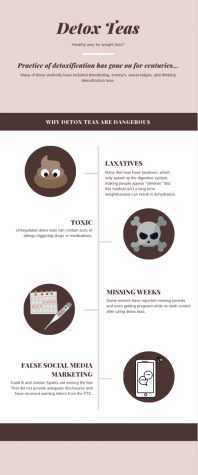The idea of detoxification has been around for thousands of years. Detox diets are said to eliminate toxic substances from your body, improve health and promote weight loss.
Over the years, peoples’ detox methods have included bloodletting, enemas, sweat lodges, fasting and drinking detoxification teas. Some of these practices were even used as medical treatments up until the early 20th century.
In today’s society, the consumption of detox teas has reached peak popularity. However, drinking weight loss tea is dangerous. Many diet teas have laxatives in them that are not meant to be used daily.
Like all dietary supplements, the ingredients in detox teas are not regulated by the U.S. Food and Drug Administration (FDA). Because of this, dangerous drugs and chemicals often go unadvertised on the tea’s packaging.
Some detox drinks include organic tea ingredients, such as tea leaves. But often, they contain toxic or allergy-triggering substances, including drugs and medications.
To add on to the harmfulness of the drink, detox teas may also have a laxative effect, speeding food through one’s digestive tract. Although this can give individuals’ abdomens a slimmer look, detox teas do not cause real or lasting loss of excess fat from the body. Instead, consumption can result in dehydration.
Hilary Bruneck of Healthline further discussed the potential negative effects of detox teas. “Some women have reported missing periods and even getting pregnant while on birth control after using detox teas,” she explained.
Social media marketing for weight loss products has sparked immense controversy. Taylor Lyles spoke about the Federal Trade Commission’s recent allegations against detox tea company Teami. “Teami earned more than $15 million in sales for its products, which it claimed would cause weight loss or treat diseases ‘without reliable scientific evidence,’ according to the FTC complaint. The FTC ordered Teami to stop these practices and return $1,000,000 to “‘consumers who were harmed,’” Lyles noted.
Rapper Cardi B and singer Jordin Sparks were among the few that did not provide adequate disclosures and have received warning letters from the FTC.
The FTC has since begun limiting influencer marketing. Additionally, the FTC mandated that all influencers disclose their advertisement posts by using post descriptions such as “ad” or “sponsored”.
PV senior Roshni Patel noted her experiences viewing deceptive advertising on social media. “I feel like social media is very dangerous in terms of misleading content. Every time I open Instagram, all I see are celebrities using their huge platforms to promote sponsored products that usually promote unhealthy lifestyles….” she expressed.
Patel conveyed a need for a solution. “Since there are so many impressionable children following these celebrities, we need to address and institute a viable solution to inform them about the true dangers hidden behind the pretty labels,” she remarked.
Director of the FTC’s Bureau of Consumer Protection Andrew Smith, discussed the potential perils of false advertising. “Social media is full of people peddling so-called detox teas, promising weight loss,” Smith stated. “Companies need to back up health claims with credible science and ensure influencers prominently disclose that they’re getting paid to promote a product.”
Several businesses promote an unhealthy way of losing weight. Detox tea diets put one’s body in an extreme caloric deficit. Additionally, the tea’s high caffeine content can be dangerous for consumers.
PV senior Paris Fietsam realizes why businesses can be misleading for profit, but highlights the risks when they do so. “I do not see many companies actually provide all the facts of what they are selling,” she indicated. “I understand why they’re not, because it’s a business and they just need good advertisement to make money, but some of the things people promote are very dangerous for a person. Companies often neglect to provide all of the facts about what is in the product.”
Many people have voiced concerns around the health effects of detox teas. Social media influencers are quick to grab the extra cash, but often fail to recognize the potentially negative impacts misleading their vulnerable audiences can have.










